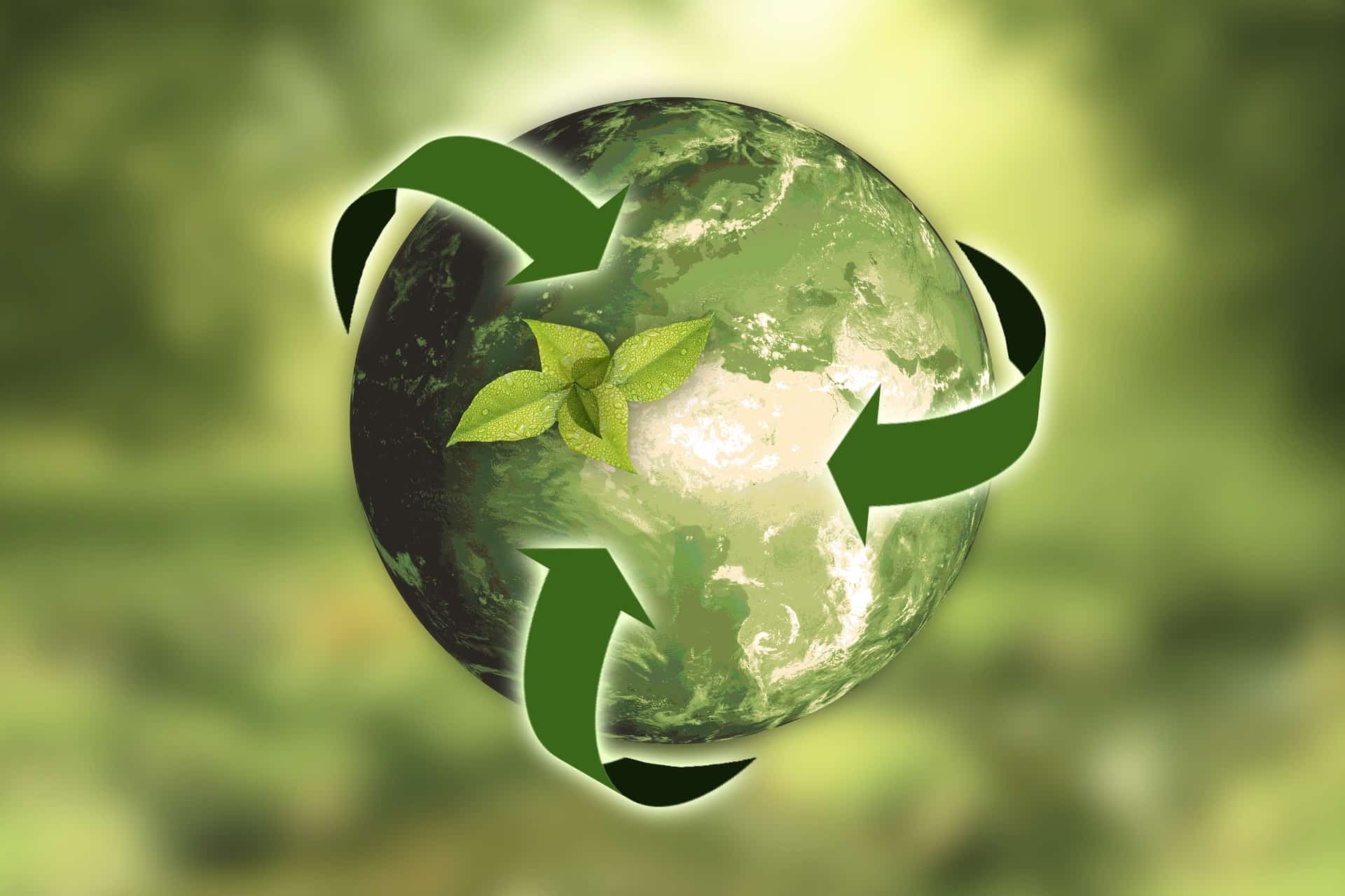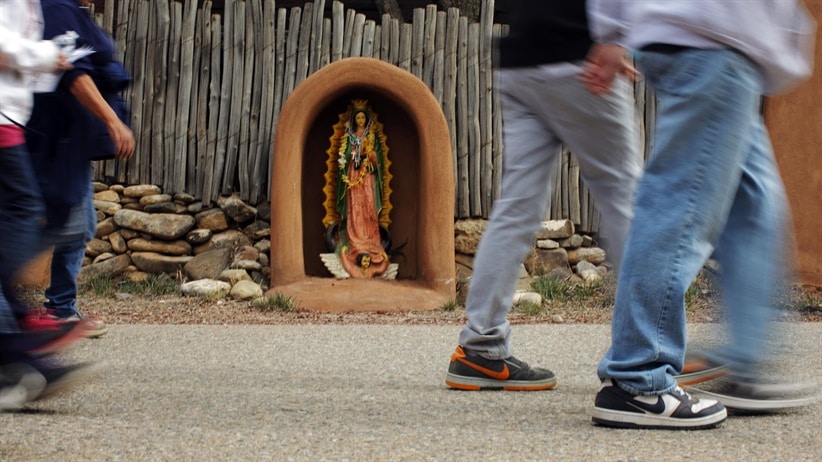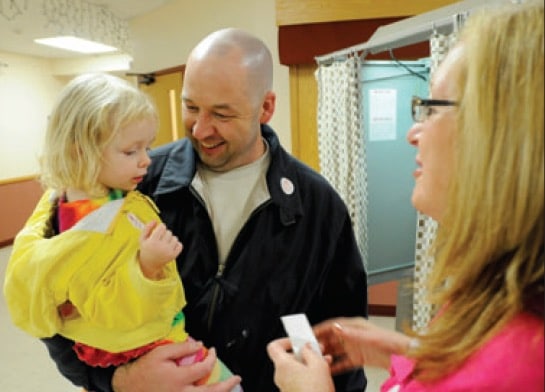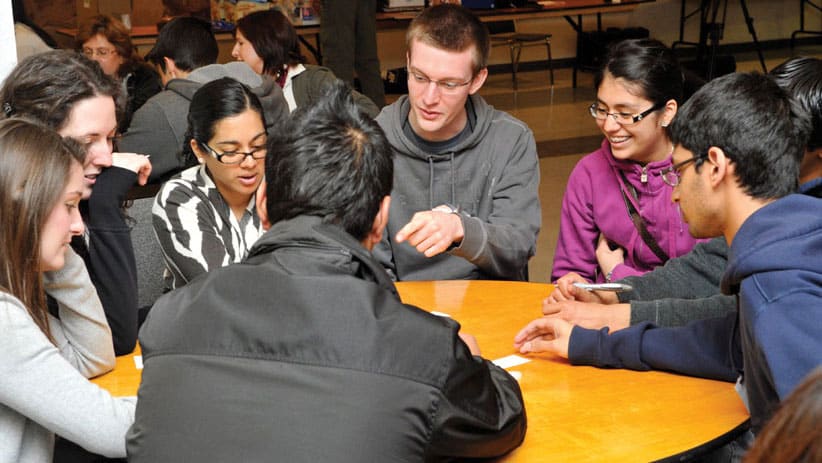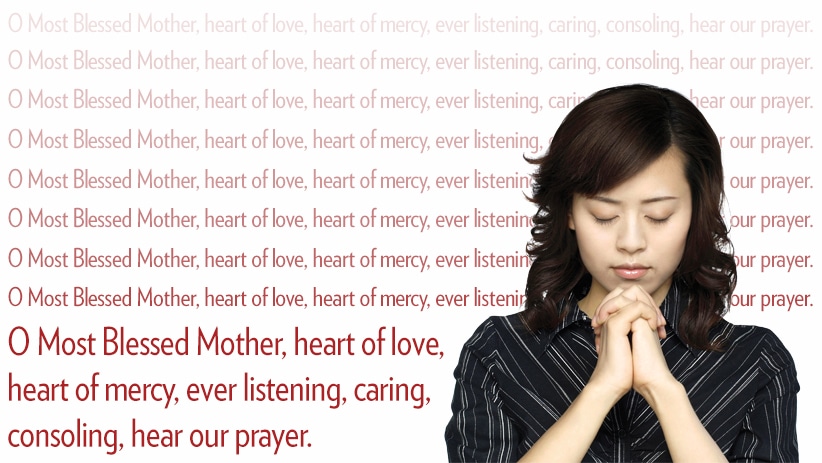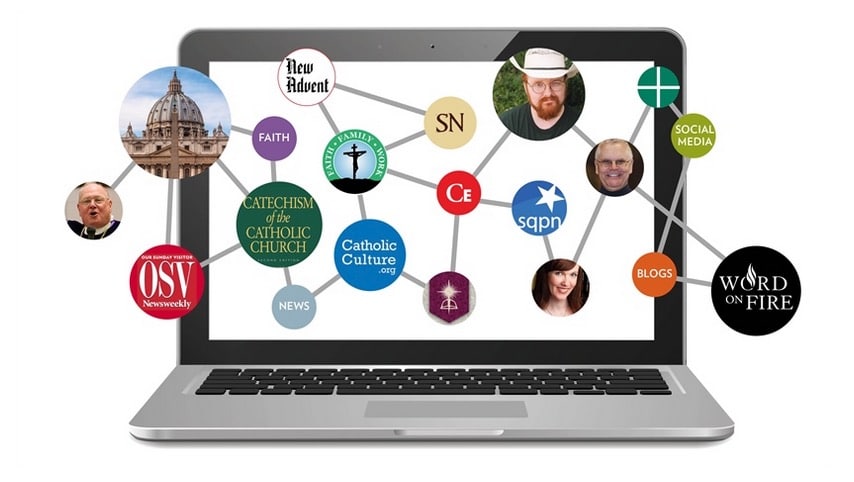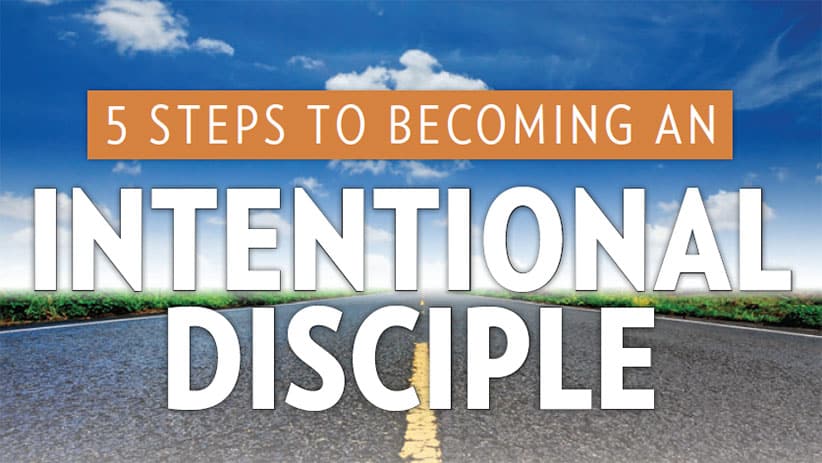It doesn’t require much imagination or study to recognize that Pope Francis’ definition of modern society as a “throwaway culture” is spot on.
We live in a world where everything is seen as disposable, replaceable or temporary, and overflowing landfills aren’t the only obvious signs. We can look at figurative pathways strewn with broken relationships, forgotten people, abandoned beliefs and dilapidated dreams to find the far-reaching effects of the throwaway mentality.
In the quest for bigger, better, faster, flashier, we have lost sight of what really matters.
Since the start of his papacy, Pope Francis has focused on the many different facets of this throwaway perspective, challenging Catholics and the larger world to shun the pop-culture quest for more, more, more in favor of solidarity — with creation, with our poorer brothers and sisters, with the weak, the elderly and the most vulnerable. And while it all sounds beautiful, true and necessary, it can be hard to live for even the most committed believer.
Where do we begin? How do we live in solidarity with the poor when we’re just trying to pay our own bills and get the kids to school? What does it mean to live a life of abundance that has nothing to do with material wealth? It all runs counter to what our culture tells us is the purpose of life and the definition of success. But when we break it down, we realize there are practical things we can do daily that will pave the way for the “garden” Pope Francis has asked us to plant, tend and nurture through stewardship.
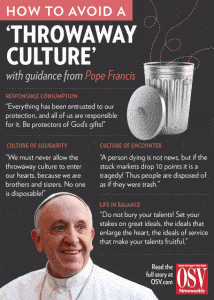
Right stewardship of our planet is certainly not a new concept. In fact, the Catechism of the Catholic Church states: “Christian life strives to order this world’s goods to God and to fraternal charity” (No. 2401). Both Pope Emeritus Benedict XVI and Blessed John Paul II emphasized this same need and God-given call during their papacies. The world now, though, seems a little more receptive to the idea and a little more ready to take on the hard work it requires.
Perhaps it’s the way the message is crafted. Perhaps it’s simply a sign of the times, a world weary from a lifetime of empty promises and constant striving. Whatever the reason, Pope Francis’ message seems to be striking a chord not only with Catholics, but with the media and the general public.
“What seems to be happening with Pope Francis is not so much that he is saying things about stewardship that are novel, but that there is a generally more receptive atmosphere toward what he is saying,” said Woodeene Koenig-Bricker, author of Ten Commandments for the Environment: Pope Benedict XVI Speaks Out for Creation and Justice” target=”_blank” rel=”noopener noreferrer”>”Ten Commandments for the Environment: Pope Benedict XVI Speaks Out for Creation and Justice” (Ave Maria, $15.95). “John Paul II, for all of the wonderful things he said on so many topics, tended to become categorized in the public mind by his teachings on the theology of the body. Benedict was viewed through the lens of liturgy and other topics. Francis hasn’t become caught in a narrow category yet, so his words on stewardship are being heard as if they were completely new. However, they are, indeed, based and grounded in Church teaching and the words of his predecessors.”
So if stewardship is a deeply held Catholic belief and challenge, what does it mean for us in our day-to-day lives? According to Margie Puerta Edson, executive director of the Catholic Foundation for the Diocese of Tucson Stewardship and Charitable Giving, it starts with our baptism and is “fundamentally the work of the Spirit.
“As Catholics we are called to live joyfully and generously and to see every aspect of life as gift from God,” she said. “When you start to understand the enormity of this concept, you start to understand that we are connected through the universal Church. You then begin to understand that stewardship isn’t about ‘things’ but about the Spirit acting, transforming, each of us and the world. I think this is what Pope Francis is trying to teach us.”
In his June 5 general audience, Pope Francis addressed this concept and laid down a challenge that brings together the separate pieces of Christian stewardship:
“I would therefore like us all to make the serious commitment to respect and care for creation, to pay attention to every person, to combat the culture of waste and of throwing out so as to foster a culture of solidarity and encounter,” he said.
Let’s look at each of those pieces more closely.
Responsible Consumption
“Everything has been entrusted to our protection, and all of us are responsible for it. Be protectors of God’s gifts!”
In the homily at his inaugural Mass, Pope Francis emphasized the need for all humans, not just Christians, to be “protectors” of creation, setting the stage for what would become a central theme of his early papacy. This role as protector does not simply mean buying “green” or recycling plastic. Instead, it goes far beyond those simple eco-friendly practices to a deeply human level — being protectors of each other, as well as the physical world.
“It means respecting each of God’s creatures and respecting the environment in which we live,” Pope Francis said. “It means protecting people, showing loving concern for each and every person, especially children, the elderly, those in need, who are often the last we think about.
“It means caring for one another in our families: husbands and wives first protect one another, and then, as parents, they care for their children, and children themselves, in time, protect their parents. It means building sincere friendships in which we protect one another in trust, respect and goodness. In the end, everything has been entrusted to our protection, and all of us are responsible for it. Be protectors of God’s gifts!”
Learning to be a protector starts within, the pope explained, urging people to first protect themselves against hatred, envy and pride, which become the seeds for larger sins and bad intentions. He echoed this sentiment when he quoted Mother Teresa in a homily at World Youth Day in Brazil, telling the 3 million young people gathered for the July 27 prayer vigil on Copacabana Beach in Rio de Janeiro that the starting point is not some far-off country, person or government, but every individual.
“You and I are the starting point,” he said. “This woman (Mother Teresa) showed determination! She knew where to start. And today I make her words my own and I say to you: Shall we begin? Where? With you and me!”
Puerta Edson told Our Sunday Visitor that stewardship is “an act of conversion of the heart.
“When the heart responds to the call to discipleship and turns toward stewardship in all aspects, it is impossible to be controlled by negative emotions. Envy, pride and hatred have the same source — they are about fear. If you are fearful, you tend to hoard things, thinking there won’t be enough ‘stuff’ for you.
| Path to Stewardship |
|---|
|
It can be overwhelming to take the first step on the path of true stewardship, but with some simple changes we can begin to live a life focused on spiritual abundance rather than material wealth:
– Look at your shopping habits, your pantry, your clothes closet and begin to notice where you buy beyond what you need. Can you donate things to a thrift store, church or nonprofit group? Can you change your grocery shopping habits so you don’t end up throwing away wilted lettuce or moldy bread?
– Turn off the faucet when you brush your teeth. Use grasses and plants native to your area so you won’t need to water so often. Catch rainwater and use it in your garden.
– Take any money you save by cutting back and find a charity that could use it to serve the poor, whether at home or abroad.
– If you don’t have a lot of financial resources or material goods to donate, look in other places. Maybe you have skills that could benefit a local charity or parish. Can you write press releases, raise funds or organize mailings?
– Maybe your gifts and talents fall into the spiritual category: Have a cup of coffee with a neighbor going through a hard time; fast once a week on behalf of world peace; visit the sick or sign up to assist the caregivers of an Alzheimer’s patient.
|
“But if you can control this tendency, then you open yourself up to seeing that good stewards actually have abundance in their lives,” she said. “Knowing the gifts that you have been given are from God, to be shared and returned to God with increase is certainly an interior disposition. I think this is why we sometimes have trouble truly living as stewards — we think the external actions are the point when in fact it is what happens inside — our transformation and response to God’s call to us.”
Of course, Pope Francis has also addressed the very real and specific issues of environment and caring for creation because, in the end, it’s not enough to simply cultivate an interior attitude of protection and caring. It must spread outward into the larger world. In Brazil he focused especially on the Amazon Basin, where destruction is wreaking havoc, especially in the lives of the poor.
“The Church’s presence in the Amazon Basin is not that of someone with bags packed and ready to leave after having exploited everything possible. The Church has been present in the Amazon Basin from the beginning, in her missionaries, religious congregations, priests, laity and bishops and she is still present and critical to the area’s future,” Pope Francis told the bishops of Brazil when he met with them July 28, challenging them to make the area into a “garden” rather than allow it to be “indiscriminately exploited.”
Similarly, at his June 5 general audience, he began by saying, “I want to focus on the issue of the environment,” and again used the image of transforming the world into a garden that is habitable for everyone.
“Benedict XVI has recalled several times that this task entrusted to us by God the Creator requires us to grasp the pace and logic of creation,” Pope Francis said. “Instead we are often guided by the pride of dominating, possessing, manipulating and exploiting; we do not ‘preserve’ the earth, we do not respect it, we do not consider it as a freely-given gift to look after.
“We are losing our attitude of wonder, of contemplation, of listening to creation and thus we no longer manage to interpret in it what Benedict XVI calls ‘the rhythm of the love-story between God and man.’ Why does this happen? Why do we think and live horizontally. We have drifted away from God, we no longer read his signs.”
Culture of encounter
“A person dying is not news, but if the stock markets drop 10 points it is a tragedy! Thus people are disposed of as if they were trash.”
Pope Francis makes the link between what he calls “human ecology” and “environmental ecology,” stressing the need to cultivate human relationships and to walk with our less fortunate brothers and sisters as part of our call to be good stewards of God’s creation. “Fraternity” is a word that surfaces again and again in Pope Francis’ homilies, speeches and impromptu remarks, but it was given an official stamp of approval last month when it was declared the theme of the 2014 World Day of Peace, which will be celebrated Jan. 1.
In announcing the theme, the Vatican stated that the theme was designed to highlight “the need to combat the ‘throwaway culture’ and to promote instead a ‘culture of encounter,’ in order to build a more just and peaceful world.”
What does a “culture of encounter” look like? According to a Vatican statement it means giving the world “a more human face” by seeing each other as brothers and sisters and not as burdens, especially those who are poor and in need of our help.
“The culture of personal well-being leads to a loss of the sense of responsibility and fraternal relationship,” the Vatican said in a statement announcing the theme, adding that when people are not seen as “being like us” they can often be viewed as being against us.
“It is no longer man who commands, but money, money — cash commands,” Pope Francis said in his June 5 general audience. “If you break a computer it is a tragedy, but poverty, the needs, the dramas of so many people end up becoming the norm. … A person dying is not news, but if the stock markets drop 10 points it is a tragedy! Thus people are disposed of, as if they were trash.”
So this idea of fraternity, of solidarity is not separate from or added onto the notion of protecting creation but is woven into the fabric of stewardship. It does not matter if we plant a vegetable garden, reduce our carbon footprint and buy organic if we are not also equally concerned — or more concerned — with the poverty and the desperate need in the world around us, whether it is in the inner city a few miles away or in an African village across the sea.
“Scripture tells us that God created the moon, the stars, night, day, plants, animals and then human beings. It is human beings that God gave responsibility for ‘care’ of everything else in creation as well as care of each other,” said Linda Perrone Rooney, author of “Walking the Disciple’s Path: Eight Steps That Will Change Your Life and the World” (Ave Maria Press, $13.95). “It’s about seeing oneself in solidarity with all else that exists. When we reach this kind of spiritual perspective on life and our relationship to life, then we naturally are more respectful of every facet of life and most especially other human beings, whose dignity is foremost in God’s heart.
“Our respect leads us to be mindful of how we then care for life — our own, creation, our relationships with others, the needs of others especially the poor and marginalized,” Perrone Rooney told OSV. “It isn’t about talking the talk; it is about walking in solidarity with all of life and giving care as we are able with our resources, gifts and unique claims on grace.”
In probably one of the more unexpected statements he’s made, Pope Francis even tied the care for others and this idea of “encounter” to the waste of food, saying that throwing food away is like “stealing from the tables of the poor.”
He encouraged people to address the issue of food waste as a “vehicle of solidarity” with the poor.
Culture of solidarity
“We must never allow the throwaway culture to enter our hearts, because we are brothers and sisters. No one is disposable!”
| Reviewing Our Gifts |
|---|
|
Writer Linda Perrone Rooney offers several suggestions for putting Pope Francis’ words about using our God-given gifts into practice: “Admit that all is gift, it’s not a result of our own genius or hard work. God is the gift-giver and what we have is gift to us. Thinking in this way begins to deepen a sense of gratitude as well as a surrender of our sense of entitlement and/or poss- essiveness. It decreases the false idol of less is less and opens a way for us to embrace the idea of abundance,” she said, explaining that “Step 2” is to do a “life review” and give serious thought to our resources and gifts — financial, intellectual and spiritual.
“What is practical will vary with each individual and family … I think of stewardship as the way in which I engage the resources at my disposal with gratitude and praise to the Creator so that they benefit not just me and my family; but also, others around me and ultimately the world at large.”
|
Those words and similar statements on caring for the poor have made headlines because they sound so radical to our modern ears. But they take us right back to the Gospel, to the words of Jesus, to St. Francis of Assisi and other great saints and sages over the centuries who stood in the public square and reminded us of our duties as Christians — right up to our modern-day popes who have challenged us to do the same. In American culture, there is a move toward “down-sizing” and “decluttering,” simplifying and getting “back to basics.”
And while that’s all well and good, what Pope Francis is saying is that those things don’t really hold, don’t really transform unless they are linked to solidarity with others — with a concern for humanity and the planet that is rooted in God, not in a cleaner house or a smaller credit card bill.
“The culture of selfishness and individualism that often prevails in our society is not … what builds up and leads to a more habitable world: rather, it is the culture of solidarity that does so,” Pope Francis said on a visit to the Varginha favela in Brazil on July 25. “We must never allow the throwaway culture to enter our hearts, because we are brothers and sisters. No one is disposable! Let us always remember this: Only when we are able to share do we become truly rich; everything that is shared is multiplied!”
In Rome on Aug. 4, in an Angelus address after his return from World Youth Day, Pope Francis spoke about the need for all people — but particularly young people — to turn away from the materialism that is rampant in the culture and to embrace a life grounded in something deeper.
“The encounter with the living Christ in his great family, which is the Church, fills hearts with joy, for it fills them with true life, with a profound goodness that endures, that does not tarnish,” Pope Francis said, warning against the “poison of emptiness which creeps into our society based on profit and possession and on consumerism which deceives young people.”
True wealth, Pope Francis continued, is not found in things devoid of real meaning and value but in the love of God shared with others.
In American culture, especially, where people find status in the things they own, that message can be tough to hear. Does it mean you can’t have an iPhone or a new car or nice clothes? Is that attempting to “serve two masters,” as Scripture warns is impossible?
It’s not the smartphone that’s inherently bad, however, but rather the obsessive need to have the best and latest version of it and to never have it far from reach. You can own a smartphone — or whatever “luxury” item is your particular poison — as long as it doesn’t own you. And, of course, the same holds true for the many other things that have a basis in materialism even if they don’t break the bank: an addiction to the daily Starbucks latte, for example, or the need to buy copious lottery tickets or to book one vacation after another.
Chances are, even if those things aren’t costing too much in dollars and cents, they may be costing us in other ways. These ways may pull us away from Christ and away from a connection to the joys and sufferings of others people who perhaps could use some of our time, attention and, yes, money.
Life in balance
“Do not bury your talents! Set your stakes on great ideals, the ideals that enlarge the heart, the ideals of service that make your talents fruitful.”
Materialism can come into play not just in what we buy, but in how we use our time, especially in a world where endless media and electronic entertainment threatens to distract us from more serious pursuits.
We hardly have to be serious all the time, but we do have to consider where we’re putting most of our time and energy. Are we staring at a screen for hours on end, ignoring real-life encounters with family and friends in favor of texting or Facebooking? Or are we wandering the local mall in pursuit of something to make us feel complete or fulfilled? We’re called to live life in balance.
When Pope Francis returned to Rome from World Youth Day, the first thing he did was visit the Basilica of St. Mary Major to offer a prayer to the Blessed Mother. He also placed a beach ball and T-shirt on the altar, giving the world a beautiful image of what joyful Catholic faith looks like. Yes, we need to make time for prayer, we need to give back a portion of our time and energy to God, but we can do so with a childlike sense of gratitude and enthusiasm that is infectious. Prayer, service, work, family, play — it’s all good, all necessary, as long as there is a healthy balance with God always at the center.
By stepping outside our own lives — our household chores, our Facebook friends, our favorite TV shows and magazines — for a little while and perhaps finding a way to serve others, we enter more fully into the human experience and see our own blessings and sorrows in relation to those of other people. That goes a long way toward building that solidarity that the pope keeps talking about.
During his April 24 general audience, Pope Francis spoke to young people in St. Peter’s Square, asking them, as they set off on their journey through life, to reflect on the talents and gifts God has given them.
“Have you thought of how you can put them at the service of others?” he asked. “Do not bury your talents! Set your stakes on great ideals, the ideals that enlarge the heart, the ideals of service that make your talents fruitful.”
Discipleship, said Puerta Edson, is a conscious decision. Over time, she added, stewardship affects our choices and how we behave toward others.
“I think it increases your awareness that you are part of a universal Church and have a responsibility to all of God’s creation,” she said. “We begin with prayer and listening to what God wants for us and not what we want God to want for us.
“We start in our families as the basic unit of the Church,” she added. “We grow to our parish and community.”
Since this is his guide, it’s only fitting to let Pope Francis have the last word on stewardship. Though more from his speech to the youths April 24, they hold meaning for us all as we embark on a life more devoted to the cares of others.
“Life is not given to us to be jealously guarded for ourselves, but is given to us so that we may give it in turn,” he said. “Dear young people, have a deep spirit! Do not be afraid to dream of great things!”
Mary DeTurris Poust is the author of Everyday Divine: A Catholic Guide to Active Spirituality” target=”_blank” rel=”noopener noreferrer”> “Everyday Divine: A Catholic Guide to Active Spirituality” (Ave Maria Press, $14.95).

